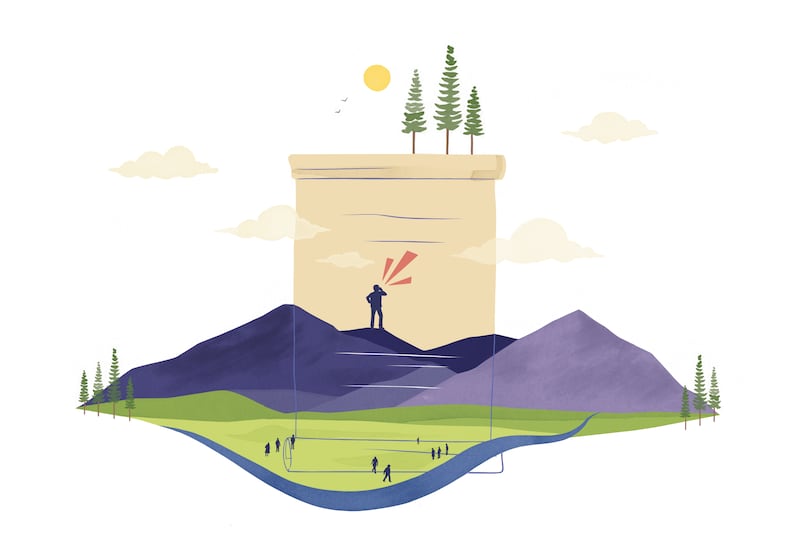You may have seen this: As an event begins, somebody takes the microphone and lists off the Native American tribes who once inhabited the place where the event is held. Such “land acknowledgments” have become common practice over the past decade, at city council meetings, university commencements, rock concerts, the Academy Awards and even the Democratic National Convention. The idea is that recognizing these former inhabitants by name reminds us that they were here, includes them in the conversation and helps to ameliorate historical injustice. But are they a useful practice for society? Or are they just an empty, self-aggrandizing ritual?
What follows is a point-counterpoint:
Overdue recognition
You can’t right a wrong until you admit it. Behind each land acknowledgment is a recognition that cities and towns across the United States — as in New Zealand, Argentina and other former colonies around the world — occupy land that was once inhabited by other peoples. The troubled history of how this came to be so, and the often dire implications for those who were here before, is implicit. Land acknowledgments encourage us to look back with empathy and reflection, sharing a societal narrative that is encompassing, honest and bends toward justice.
This simple practice, which costs nothing and requires no special training, can challenge us to think more critically and holistically about our own histories. This is not about changing facts or choosing sides but rather understanding that the stories handed down to most of us were told from the perspective of the victors in conflicts over these territories. It’s only fair that we practice seeing those events through the perspectives of all participants and understanding their experiences as well.
If this conversation makes us uncomfortable, maybe it should. Displaced peoples have endured violence, confinement on reservations, forced assimilation, attacks on their languages and cultures, and ongoing discrimination. Naming them makes that history more visible. “Land acknowledgments should not be feel-good maneuvers,” write three anthropology professors from the University of North Carolina at Chapel Hill and San Diego State University — including members of the Cherokee and Choctaw tribes — in Anthropology News. “If an acknowledgment is discomforting and triggers uncomfortable conversations, it is likely on the right track.”
Think of land acknowledgements as a helpful first step on the path to lasting reconciliation, and an invitation to engage with today’s descendants of those first peoples, including Native Americans. History can feel abstract, but the painful experiences described here have shaped both those who lived them and their descendants. And if we want to connect across cultural divides, it’s essential to meet people where they are. According to the National Museum of the American Indian, “Speaking and hearing words of recognition is an important step in creating collaborative, accountable, continuous, and respectful relationships with Indigenous nations and communities.”
Empty signals
Land acknowledgments are as vain as they often feel. The lives we live today are built on the results of decisions made, actions taken, successes achieved and losses suffered by those who came before us. Even for those who don’t like the outcome, there is little we can do to change it. Watching people who still benefit from that history as they awkwardly name the peoples whose defeat made their lives possible looks more like self-indulgence than justice. It’s what members of Gen Z might call “cringe.”
The practice offers no solutions, and its adherents sacrifice nothing of value — no giving away the family home, no moving back to the old country — while clinging to a superficial view of tribal identity in which names are enough. “A land acknowledgment is what you give when you have no intention of giving land,” Graeme Wood writes in The Atlantic. “It is like a receipt provided by a highway robber, noting all the jewels and gold coins he has stolen.”
From a broader view, it’s impossible to honor all the former stewards of any land. Most territory anywhere has changed hands throughout history — often in a manner no less violent or painful than colonialism or westward expansion. For example, land acknowledgments in Chicago often cite the Potawatomi, “because when ‘white’ people arrived here, that is who they found,” writes University of Chicago law professor M. Todd Henderson in Newsweek. “But native tribes engaged in constant conquest and displacement as well. The Potawatomi are no more the ‘original’ or ‘true’ owners of Chicago than the European settlers that displaced them.”
In reality, land acknowledgements are a performative act more for the benefit of the speaker than for the peoples being spoken for. Consider the platform of last year’s Democratic National Convention, which name-drops 12 tribes in its first four paragraphs but offers no plan for restoring their ancestral lands — because that is not the intention. Instead, the party pats itself on the back. But virtue signaling isn’t just vapid — it can get in the way of real progress. Specifically, land acknowledgments “become an excuse for folks to feel good and move on with their lives,” notes the Native Governance Center, “without actually contributing anything to the community.”
This story appears in the July/August 2025 issue of DeseretMagazine. Learn more about how to subscribe.


